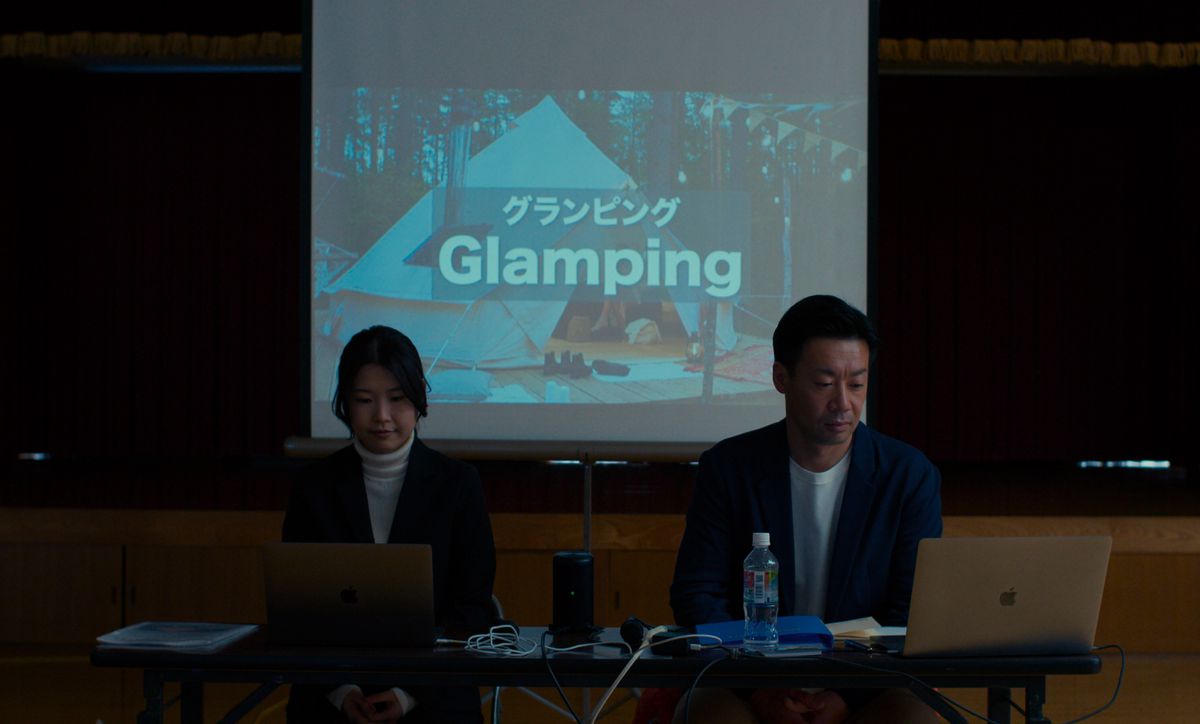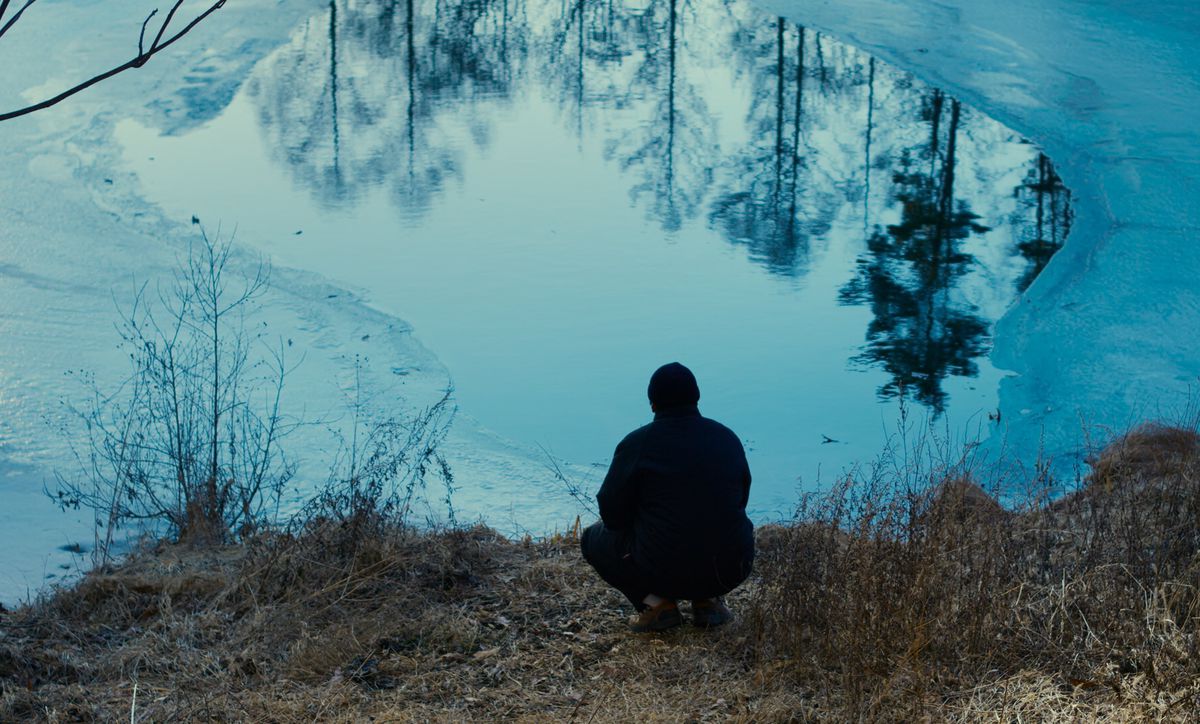I spent a lot of time contemplating the title of Ryûsuke Hamaguchi’s new film Evil Does Not Exist. It still echoes in my brain, as I watch and rewatch the film. It’s a puzzle to turn over, a bitter lozenge lodged in my cheek. It’s almost farcical, how banal the movie’s premise is: a talent agency wants to set up a glamping site in a remote Japanese village, and sends two hapless PR reps to sell the community on the plan. Most of us don’t contemplate the nature of evil when considering glamping, you know? But maybe we should.
At its most obvious, Evil Does Not Exist is an environmentalist fable. Hamaguchi, who previously directed Drive My Car, moves at a languid pace, and the sparseness of his script means that, on a plot level, few things happen in this movie. The film is built around a 20-minute town-hall meeting. Otherwise, it mostly follows Takumi (Hitoshi Omika), a widower raising a young daughter, Hana (Ryô Nishikawa) and earning a living doing odd jobs in his mountain village. He collects water from a spring for a local restaurant, splits firewood, and does whatever else needs doing. Hamaguchi is happy to have the camera follow Takumi at a comfortable distance as he goes about his day.
Through Takumi’s eyes, the audience gets a clear point of view on the community reaction to the agency’s plans for a glamping development, as the locals articulate their relationship with the environment and how the project would destroy that. It’s quite clear, though, that the agency’s interest in community input is solely for optics. No one actually cares what the villagers think.
And the agency’s owner — who can’t be bothered to show up to the town hall himself — doesn’t even seem that invested in the glamping endeavor. The company’s stated goal isn’t in branching out into recreational services, but in obtaining pandemic subsidies from the government to boost its bottom line. You could call that evil.

Image: Sideshow and Janus Films
Hamaguchi began work on Evil Does Not Exist with the intention of creating a visual art piece to accompany the work of musician Eiko Ishibashi, who also composed the score for Drive My Car. Even expanded into a 106-minute feature film, Evil Does Not Exist retains the feeling of an abstract tone poem, more about what the viewer has to say in response than about anything the filmmaker puts on screen. The moral obviousness of the film’s central conflict, therefore, feels like a trick — a sleight of hand, a dare to watch more closely.
It’s easy to idealize Takumi’s life, the way Takahashi (Ryûji Kosaka), one of the agency reps, does upon meeting him. Takahashi and his colleague Mayuzumi (Ayaka Shibutani) return to the village after the town-hall meet goes poorly, with instructions to offer Takumi a job at the glamping site so he can convince the other villagers to support the development. Takahashi, however, fantasizes about running off and just living in Takumi’s village, gushing about how good it feels to chop wood, to do something with his hands.

Image: Sideshow and Janus Films
Both Takumi and Takahashi — like everyone in the village, like you or I would be, were we to find ourselves in front of Hamaguchi’s camera — are still strangers to the natural world that this fictional village is built around and depends on. It is possible to be respectful to that world, as a village elder says during the town hall, noting the community’s responsibility to think of everything downstream of them. But it’s arrogant to think we truly understand the wilds around us. To behave as if we belong.
In this, Evil Does Not Exist leans toward a folk-horror tradition, as Hamaguchi slowly pivots away from dispassionate naturalism, building to an impressionistic, opaque finale. The provocation of the film’s title echoes through the woods, which the film begins and ends by regarding from below. Maybe that’s what the title is getting at. Maybe it’s a whisper echoing through and from the ground itself, about how foolish it is to believe that the earth, even in its stillness and beauty, has any regard for our moral attitude toward it. Maybe we ought to tread more carefully, and be fearful in our taking. Maybe evil only matters because we’re here to think about it, and when we’re gone, it will be too.
Evil Does Not Exist opened in limited theatrical release May 3, with a wider rollout May 10 and beyond.
- SEO Powered Content & PR Distribution. Get Amplified Today.
- PlatoData.Network Vertical Generative Ai. Empower Yourself. Access Here.
- PlatoAiStream. Web3 Intelligence. Knowledge Amplified. Access Here.
- PlatoESG. Carbon, CleanTech, Energy, Environment, Solar, Waste Management. Access Here.
- PlatoHealth. Biotech and Clinical Trials Intelligence. Access Here.
- Source: https://www.polygon.com/reviews/24153139/evil-does-not-exist-review-ryusuke-hamaguchi
- :has
- :is
- :not
- $UP
- 10
- a
- About
- about IT
- ABSTRACT
- accompany
- actually
- After
- agency
- almost
- also
- an
- and
- answers
- any
- anything
- ARE
- around
- Art
- art piece
- articulate
- AS
- At
- attitude
- audience
- away
- ayaka
- BE
- Beauty
- because
- began
- begins
- behave
- behind
- believe
- below
- Beyond
- boost
- Bottom
- Brain
- Building
- built
- business
- but
- by
- call
- camera
- CAN
- carefully
- central
- clear
- closely
- colleague
- collects
- comfortable
- community
- Company’s
- composed
- conflict
- considering
- convince
- could
- Creating
- daughter
- day
- depends
- destroy
- Development
- directed
- distance
- do
- does
- Doesn’t
- doing
- Dont
- during
- Earning
- earth
- easy
- echoes
- echoing
- Edge
- elder
- else
- endeavor
- ends
- Environment
- Ether (ETH)
- Even
- everyone
- everything
- exist
- expanded
- Eyes
- Feature
- feeling
- feels
- few
- fictional
- Figure
- Film
- finale
- Find
- follow
- follows
- For
- from
- front
- gets
- getting
- goal
- Goes
- gone
- good
- Government
- Ground
- Hall
- hand
- Hands
- happen
- happy
- Have
- he
- here
- him
- himself
- his
- How
- However
- HTML
- HTTPS
- i
- if
- in
- input
- instructions
- Intention
- interest
- into
- invested
- IT
- ITS
- itself
- Japanese
- Job
- Jobs
- jpg
- just
- Know
- lake
- Level
- Life
- like
- Limited
- Line
- living
- local
- Lot
- Matters
- May..
- maybe
- means
- Meet
- meeting
- moral
- more
- most
- mostly
- Mountain
- moves
- movie
- Movies
- Musician
- my
- Natural
- Nature
- needs
- New
- no
- noting
- obtaining
- obvious
- of
- off
- offer
- Offers
- on
- ONE
- only
- opaque
- opened
- optics
- or
- Other
- otherwise
- our
- ourselves
- out
- over
- owner
- Pace
- pandemic
- People
- piece
- Pivots
- plan
- plans
- plato
- Plato Data Intelligence
- PlatoData
- plot
- Point
- Point of View
- Polygon
- possible
- pr
- previously
- project
- provocation
- Puts
- puzzle
- Questions
- quite
- raising
- reaction
- Recreational
- reflecting
- regard
- regarding
- relationship
- release
- remote
- response
- responsibility
- restaurant
- return
- rollout
- running
- say
- says
- score
- Screen
- script
- seem
- seen
- sell
- sends
- Services
- set
- should
- show
- sit
- site
- Slide
- Slowly
- So
- solely
- something
- spent
- Splits
- spring
- stated
- Still
- support
- Surface
- table
- taking
- Talent
- terrifying
- than
- that
- The
- theatrical
- their
- Them
- therefore
- things
- Think
- this
- though?
- Through
- time
- Title
- to
- TONE
- too
- toward
- town
- Town Hall
- tradition
- tread
- trick
- truly
- TURN
- two
- upon
- us
- View
- viewer
- Village
- visual
- visual art
- wants
- Watch
- Water
- Way..
- we
- webp
- were
- What
- whatever
- when
- which
- Whisper
- WHO
- wider
- will
- with
- wood
- Woods
- Work
- world
- would
- you
- young
- zephyrnet









